air condition CHEVROLET CORVETTE 2011 6.G Owners Manual
[x] Cancel search | Manufacturer: CHEVROLET, Model Year: 2011, Model line: CORVETTE, Model: CHEVROLET CORVETTE 2011 6.GPages: 428, PDF Size: 6.63 MB
Page 5 of 428

Black plate (5,1)Chevrolet Corvette Owner Manual - 2011
Introduction v
Vehicle Symbol Chart
Here are some additional symbols
that may be found on the vehicle
and what they mean. For more
information on the symbol, refer
to the Index.
9:Airbag Readiness Light
#:Air Conditioning
!:Antilock Brake System (ABS)
g:Audio Steering Wheel Controls
or OnStar®
$: Brake System Warning Light
":Charging System
I:Cruise Control
B: Engine Coolant Temperature
O:Exterior Lamps
#:Fog Lamps
.: Fuel Gauge
+:Fuses
3: Headlamp High/Low-Beam
Changer
j: LATCH System Child
Restraints
*: Malfunction Indicator Lamp
::Oil Pressure
}:Power
/:Remote Vehicle Start
>:Safety Belt Reminders
7:Tire Pressure Monitor
F:Traction Control
M:Windshield Washer Fluid
Page 16 of 428
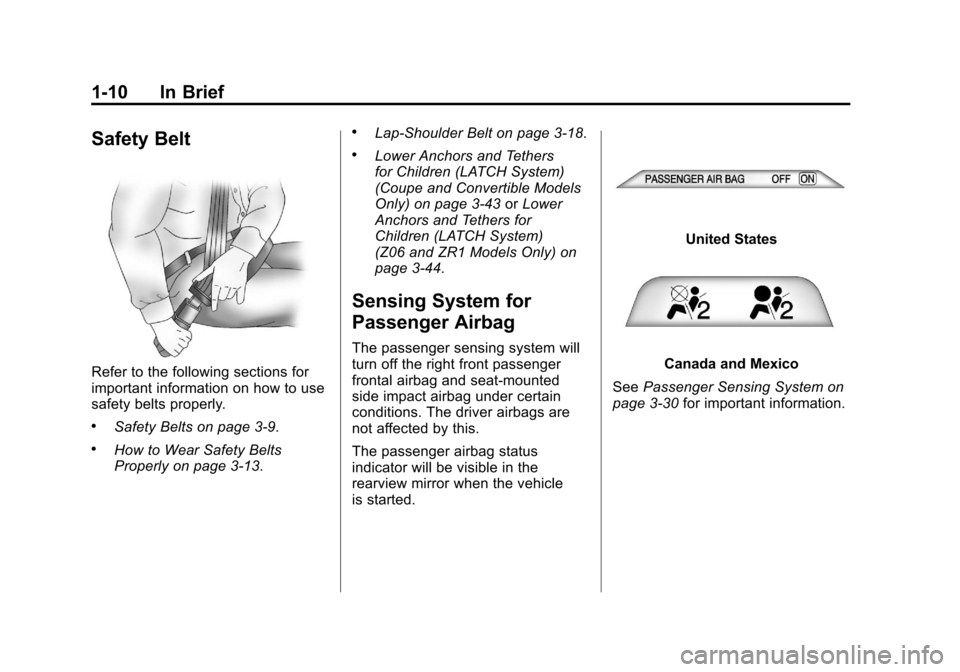
Black plate (10,1)Chevrolet Corvette Owner Manual - 2011
1-10 In Brief
Safety Belt
Refer to the following sections for
important information on how to use
safety belts properly.
.Safety Belts on page 3‑9.
.How to Wear Safety Belts
Properly on page 3‑13.
.Lap-Shoulder Belt on page 3‑18.
.Lower Anchors and Tethers
for Children (LATCH System)
(Coupe and Convertible Models
Only) on page 3‑43orLower
Anchors and Tethers for
Children (LATCH System)
(Z06 and ZR1 Models Only) on
page 3‑44.
Sensing System for
Passenger Airbag
The passenger sensing system will
turn off the right front passenger
frontal airbag and seat‐mounted
side impact airbag under certain
conditions. The driver airbags are
not affected by this.
The passenger airbag status
indicator will be visible in the
rearview mirror when the vehicle
is started.
United States
Canada and Mexico
See Passenger Sensing System on
page 3‑30 for important information.
Page 20 of 428
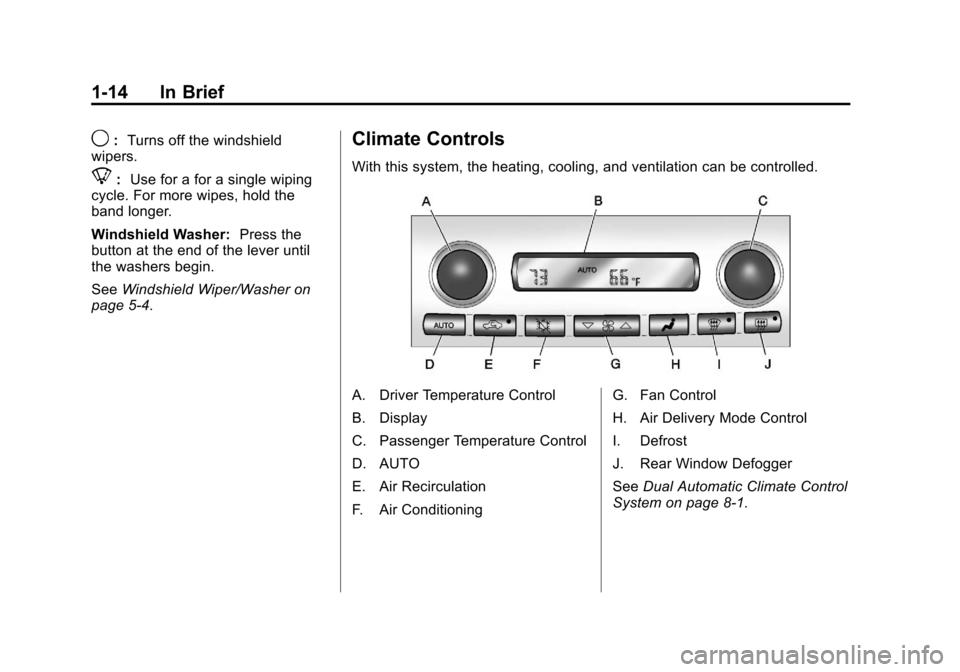
Black plate (14,1)Chevrolet Corvette Owner Manual - 2011
1-14 In Brief
9:Turns off the windshield
wipers.
8: Use for a for a single wiping
cycle. For more wipes, hold the
band longer.
Windshield Washer: Press the
button at the end of the lever until
the washers begin.
See Windshield Wiper/Washer on
page 5‑4.
Climate Controls
With this system, the heating, cooling, and ventilation can be controlled.
A. Driver Temperature Control
B. Display
C. Passenger Temperature Control
D. AUTO
E. Air Recirculation
F. Air Conditioning G. Fan Control
H. Air Delivery Mode Control
I. Defrost
J. Rear Window Defogger
See
Dual Automatic Climate Control
System on page 8‑1.
Page 54 of 428
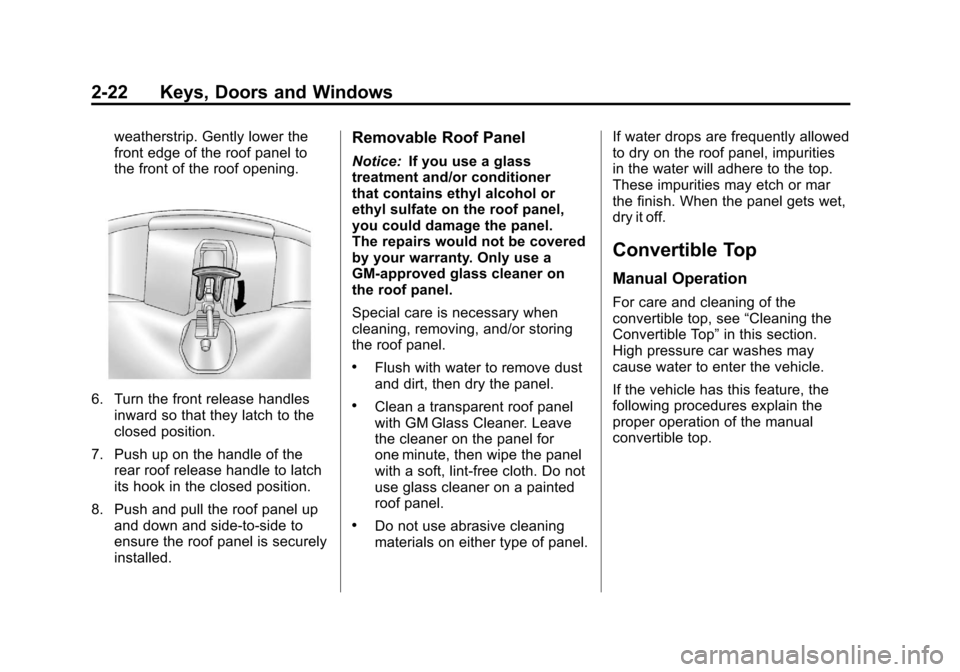
Black plate (22,1)Chevrolet Corvette Owner Manual - 2011
2-22 Keys, Doors and Windows
weatherstrip. Gently lower the
front edge of the roof panel to
the front of the roof opening.
6. Turn the front release handlesinward so that they latch to the
closed position.
7. Push up on the handle of the rear roof release handle to latch
its hook in the closed position.
8. Push and pull the roof panel up and down and side-to-side to
ensure the roof panel is securely
installed.
Removable Roof Panel
Notice: If you use a glass
treatment and/or conditioner
that contains ethyl alcohol or
ethyl sulfate on the roof panel,
you could damage the panel.
The repairs would not be covered
by your warranty. Only use a
GM-approved glass cleaner on
the roof panel.
Special care is necessary when
cleaning, removing, and/or storing
the roof panel.
.Flush with water to remove dust
and dirt, then dry the panel.
.Clean a transparent roof panel
with GM Glass Cleaner. Leave
the cleaner on the panel for
one minute, then wipe the panel
with a soft, lint-free cloth. Do not
use glass cleaner on a painted
roof panel.
.Do not use abrasive cleaning
materials on either type of panel. If water drops are frequently allowed
to dry on the roof panel, impurities
in the water will adhere to the top.
These impurities may etch or mar
the finish. When the panel gets wet,
dry it off.
Convertible Top
Manual Operation
For care and cleaning of the
convertible top, see
“Cleaning the
Convertible Top” in this section.
High pressure car washes may
cause water to enter the vehicle.
If the vehicle has this feature, the
following procedures explain the
proper operation of the manual
convertible top.
Page 55 of 428
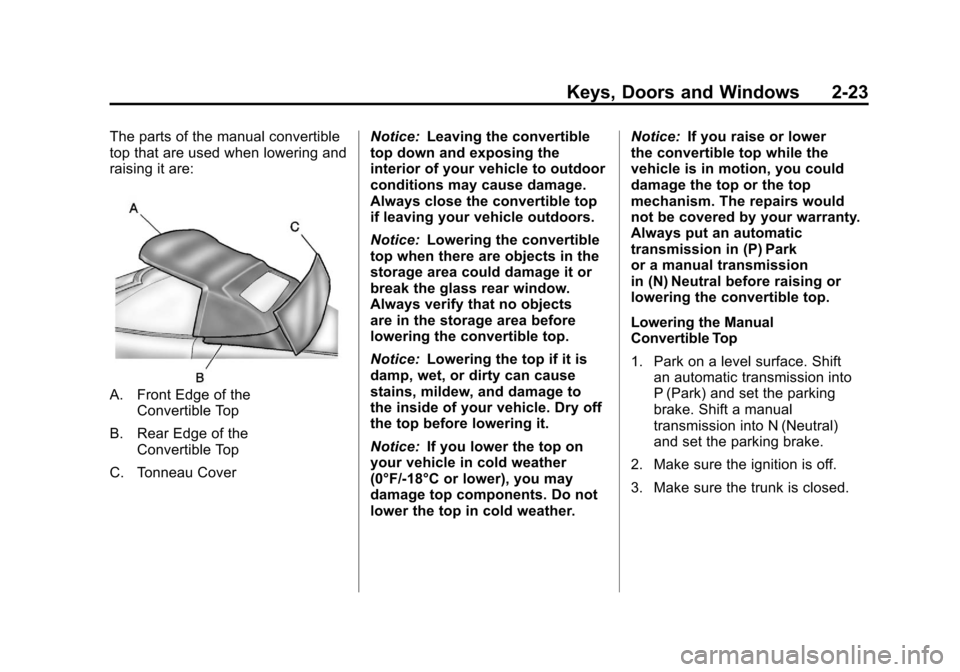
Black plate (23,1)Chevrolet Corvette Owner Manual - 2011
Keys, Doors and Windows 2-23
The parts of the manual convertible
top that are used when lowering and
raising it are:
A. Front Edge of theConvertible Top
B. Rear Edge of the Convertible Top
C. Tonneau Cover Notice:
Leaving the convertible
top down and exposing the
interior of your vehicle to outdoor
conditions may cause damage.
Always close the convertible top
if leaving your vehicle outdoors.
Notice: Lowering the convertible
top when there are objects in the
storage area could damage it or
break the glass rear window.
Always verify that no objects
are in the storage area before
lowering the convertible top.
Notice: Lowering the top if it is
damp, wet, or dirty can cause
stains, mildew, and damage to
the inside of your vehicle. Dry off
the top before lowering it.
Notice: If you lower the top on
your vehicle in cold weather
(0°F/-18°C or lower), you may
damage top components. Do not
lower the top in cold weather. Notice:
If you raise or lower
the convertible top while the
vehicle is in motion, you could
damage the top or the top
mechanism. The repairs would
not be covered by your warranty.
Always put an automatic
transmission in (P) Park
or a manual transmission
in (N) Neutral before raising or
lowering the convertible top.
Lowering the Manual
Convertible Top
1. Park on a level surface. Shift an automatic transmission into
P (Park) and set the parking
brake. Shift a manual
transmission into N (Neutral)
and set the parking brake.
2. Make sure the ignition is off.
3. Make sure the trunk is closed.
Page 60 of 428
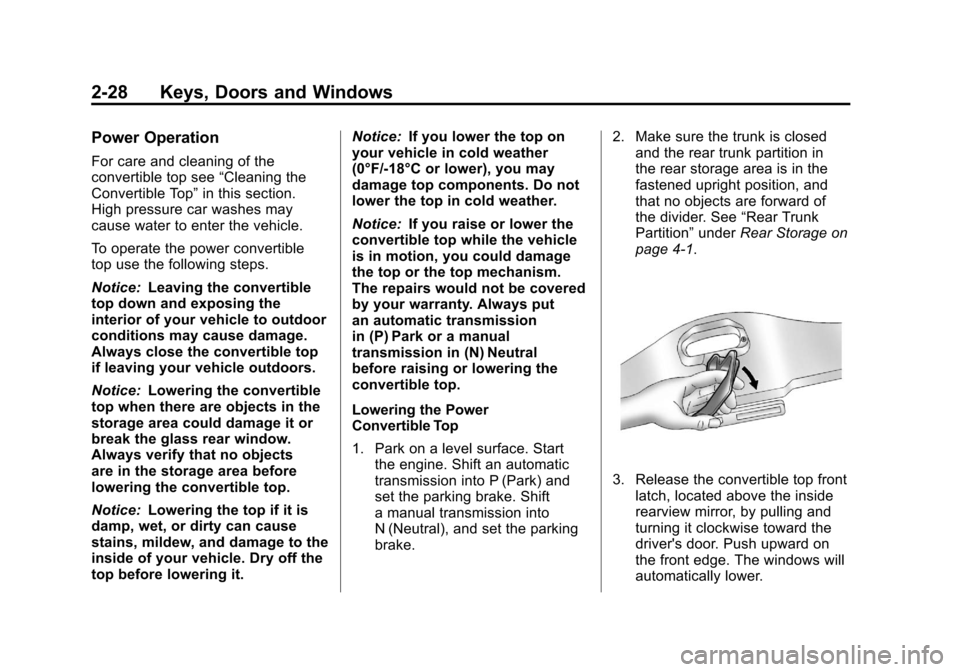
Black plate (28,1)Chevrolet Corvette Owner Manual - 2011
2-28 Keys, Doors and Windows
Power Operation
For care and cleaning of the
convertible top see“Cleaning the
Convertible Top” in this section.
High pressure car washes may
cause water to enter the vehicle.
To operate the power convertible
top use the following steps.
Notice: Leaving the convertible
top down and exposing the
interior of your vehicle to outdoor
conditions may cause damage.
Always close the convertible top
if leaving your vehicle outdoors.
Notice: Lowering the convertible
top when there are objects in the
storage area could damage it or
break the glass rear window.
Always verify that no objects
are in the storage area before
lowering the convertible top.
Notice: Lowering the top if it is
damp, wet, or dirty can cause
stains, mildew, and damage to the
inside of your vehicle. Dry off the
top before lowering it. Notice:
If you lower the top on
your vehicle in cold weather
(0°F/-18°C or lower), you may
damage top components. Do not
lower the top in cold weather.
Notice: If you raise or lower the
convertible top while the vehicle
is in motion, you could damage
the top or the top mechanism.
The repairs would not be covered
by your warranty. Always put
an automatic transmission
in (P) Park or a manual
transmission in (N) Neutral
before raising or lowering the
convertible top.
Lowering the Power
Convertible Top
1. Park on a level surface. Start the engine. Shift an automatic
transmission into P (Park) and
set the parking brake. Shift
a manual transmission into
N (Neutral), and set the parking
brake. 2. Make sure the trunk is closed
and the rear trunk partition in
the rear storage area is in the
fastened upright position, and
that no objects are forward of
the divider. See “Rear Trunk
Partition” underRear Storage on
page 4‑1.
3. Release the convertible top front latch, located above the inside
rearview mirror, by pulling and
turning it clockwise toward the
driver's door. Push upward on
the front edge. The windows will
automatically lower.
Page 61 of 428
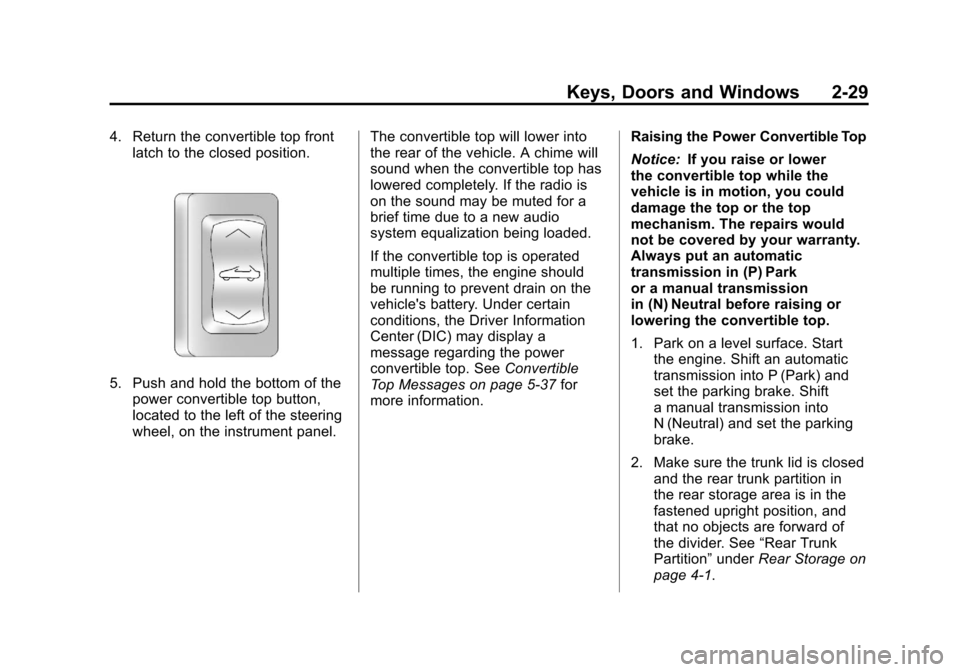
Black plate (29,1)Chevrolet Corvette Owner Manual - 2011
Keys, Doors and Windows 2-29
4. Return the convertible top frontlatch to the closed position.
5. Push and hold the bottom of thepower convertible top button,
located to the left of the steering
wheel, on the instrument panel. The convertible top will lower into
the rear of the vehicle. A chime will
sound when the convertible top has
lowered completely. If the radio is
on the sound may be muted for a
brief time due to a new audio
system equalization being loaded.
If the convertible top is operated
multiple times, the engine should
be running to prevent drain on the
vehicle's battery. Under certain
conditions, the Driver Information
Center (DIC) may display a
message regarding the power
convertible top. See
Convertible
Top Messages on page 5‑37 for
more information. Raising the Power Convertible Top
Notice:
If you raise or lower
the convertible top while the
vehicle is in motion, you could
damage the top or the top
mechanism. The repairs would
not be covered by your warranty.
Always put an automatic
transmission in (P) Park
or a manual transmission
in (N) Neutral before raising or
lowering the convertible top.
1. Park on a level surface. Start the engine. Shift an automatic
transmission into P (Park) and
set the parking brake. Shift
a manual transmission into
N (Neutral) and set the parking
brake.
2. Make sure the trunk lid is closed and the rear trunk partition in
the rear storage area is in the
fastened upright position, and
that no objects are forward of
the divider. See “Rear Trunk
Partition” underRear Storage on
page 4‑1.
Page 84 of 428
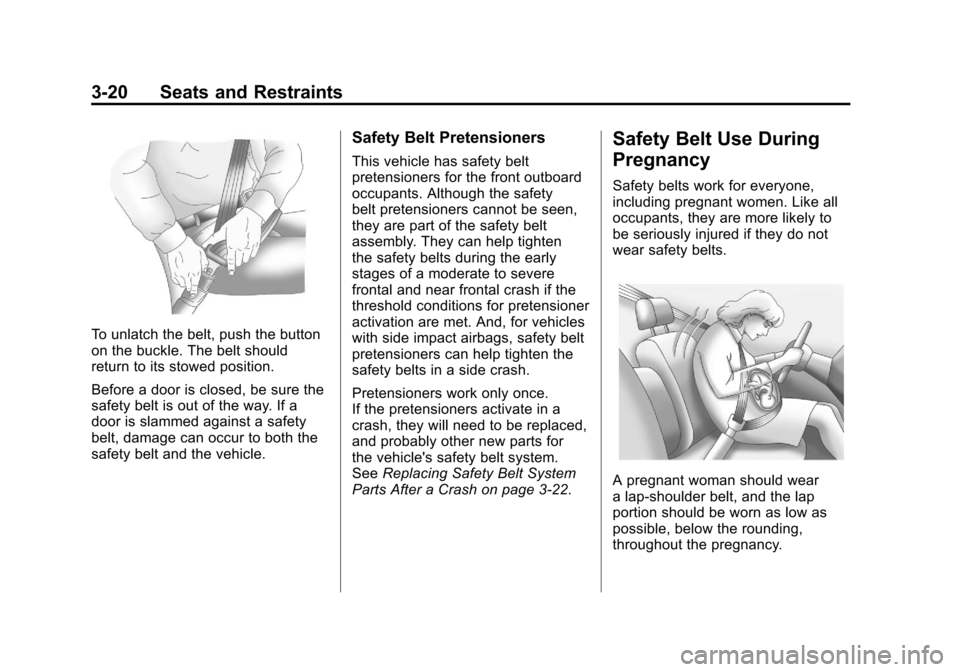
Black plate (20,1)Chevrolet Corvette Owner Manual - 2011
3-20 Seats and Restraints
To unlatch the belt, push the button
on the buckle. The belt should
return to its stowed position.
Before a door is closed, be sure the
safety belt is out of the way. If a
door is slammed against a safety
belt, damage can occur to both the
safety belt and the vehicle.
Safety Belt Pretensioners
This vehicle has safety belt
pretensioners for the front outboard
occupants. Although the safety
belt pretensioners cannot be seen,
they are part of the safety belt
assembly. They can help tighten
the safety belts during the early
stages of a moderate to severe
frontal and near frontal crash if the
threshold conditions for pretensioner
activation are met. And, for vehicles
with side impact airbags, safety belt
pretensioners can help tighten the
safety belts in a side crash.
Pretensioners work only once.
If the pretensioners activate in a
crash, they will need to be replaced,
and probably other new parts for
the vehicle's safety belt system.
SeeReplacing Safety Belt System
Parts After a Crash on page 3‑22.
Safety Belt Use During
Pregnancy
Safety belts work for everyone,
including pregnant women. Like all
occupants, they are more likely to
be seriously injured if they do not
wear safety belts.
A pregnant woman should wear
a lap-shoulder belt, and the lap
portion should be worn as low as
possible, below the rounding,
throughout the pregnancy.
Page 94 of 428
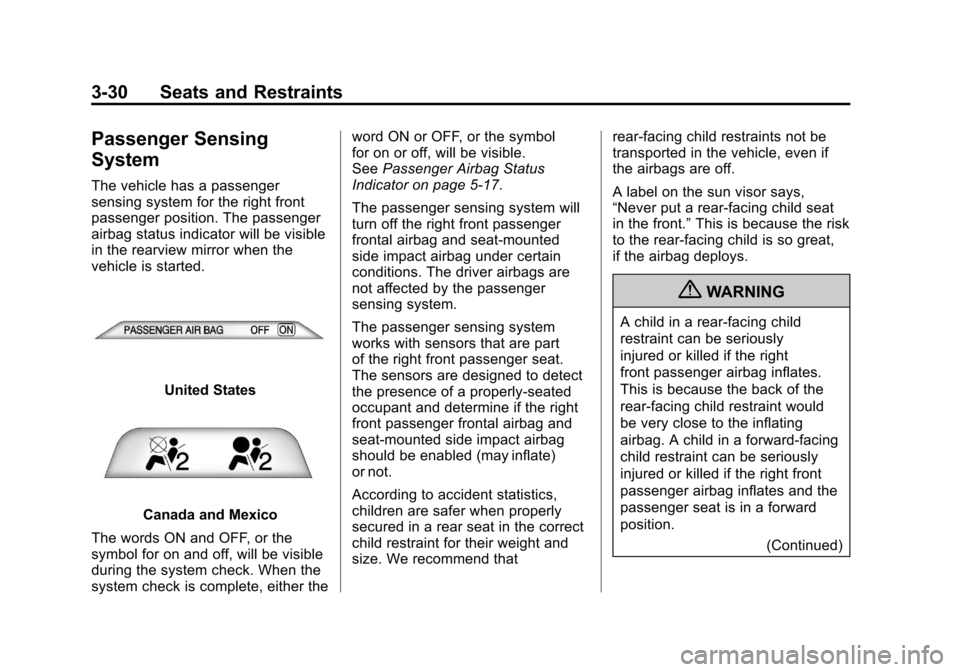
Black plate (30,1)Chevrolet Corvette Owner Manual - 2011
3-30 Seats and Restraints
Passenger Sensing
System
The vehicle has a passenger
sensing system for the right front
passenger position. The passenger
airbag status indicator will be visible
in the rearview mirror when the
vehicle is started.
United States
Canada and Mexico
The words ON and OFF, or the
symbol for on and off, will be visible
during the system check. When the
system check is complete, either the word ON or OFF, or the symbol
for on or off, will be visible.
See
Passenger Airbag Status
Indicator on page 5‑17.
The passenger sensing system will
turn off the right front passenger
frontal airbag and seat-mounted
side impact airbag under certain
conditions. The driver airbags are
not affected by the passenger
sensing system.
The passenger sensing system
works with sensors that are part
of the right front passenger seat.
The sensors are designed to detect
the presence of a properly-seated
occupant and determine if the right
front passenger frontal airbag and
seat-mounted side impact airbag
should be enabled (may inflate)
or not.
According to accident statistics,
children are safer when properly
secured in a rear seat in the correct
child restraint for their weight and
size. We recommend that rear-facing child restraints not be
transported in the vehicle, even if
the airbags are off.
A label on the sun visor says,
“Never put a rear-facing child seat
in the front.”
This is because the risk
to the rear-facing child is so great,
if the airbag deploys.
{WARNING
A child in a rear-facing child
restraint can be seriously
injured or killed if the right
front passenger airbag inflates.
This is because the back of the
rear-facing child restraint would
be very close to the inflating
airbag. A child in a forward-facing
child restraint can be seriously
injured or killed if the right front
passenger airbag inflates and the
passenger seat is in a forward
position.
(Continued)
Page 112 of 428
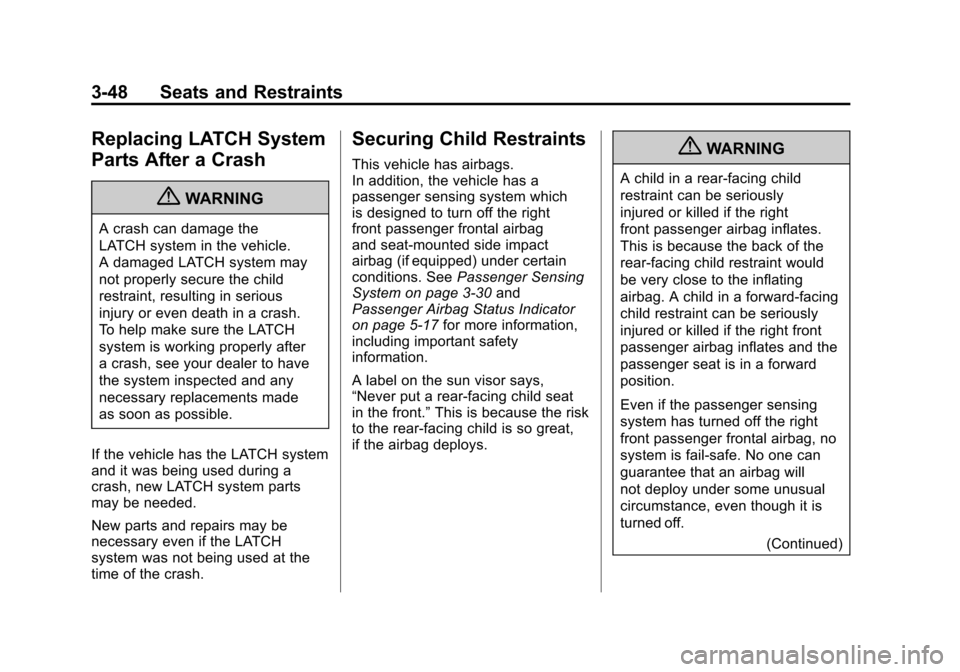
Black plate (48,1)Chevrolet Corvette Owner Manual - 2011
3-48 Seats and Restraints
Replacing LATCH System
Parts After a Crash
{WARNING
A crash can damage the
LATCH system in the vehicle.
A damaged LATCH system may
not properly secure the child
restraint, resulting in serious
injury or even death in a crash.
To help make sure the LATCH
system is working properly after
a crash, see your dealer to have
the system inspected and any
necessary replacements made
as soon as possible.
If the vehicle has the LATCH system
and it was being used during a
crash, new LATCH system parts
may be needed.
New parts and repairs may be
necessary even if the LATCH
system was not being used at the
time of the crash.
Securing Child Restraints
This vehicle has airbags.
In addition, the vehicle has a
passenger sensing system which
is designed to turn off the right
front passenger frontal airbag
and seat-mounted side impact
airbag (if equipped) under certain
conditions. See Passenger Sensing
System on page 3‑30 and
Passenger Airbag Status Indicator
on page 5‑17 for more information,
including important safety
information.
A label on the sun visor says,
“Never put a rear-facing child seat
in the front.” This is because the risk
to the rear-facing child is so great,
if the airbag deploys.{WARNING
A child in a rear-facing child
restraint can be seriously
injured or killed if the right
front passenger airbag inflates.
This is because the back of the
rear-facing child restraint would
be very close to the inflating
airbag. A child in a forward-facing
child restraint can be seriously
injured or killed if the right front
passenger airbag inflates and the
passenger seat is in a forward
position.
Even if the passenger sensing
system has turned off the right
front passenger frontal airbag, no
system is fail-safe. No one can
guarantee that an airbag will
not deploy under some unusual
circumstance, even though it is
turned off.
(Continued)